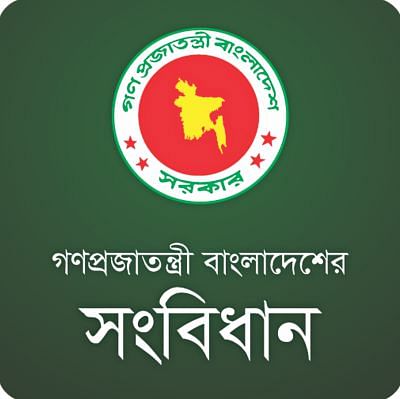Article 1: <i>The Republic</i>

“Bangladesh is a unitary, independent, sovereign Republic to be known as the People's Republic of Bangladesh.”
It will not be an exaggeration if article 1 is called the most important of all the provisions of Bangladesh Constitution. It was adopted as part of the Constitution Bill by the Constituent Assembly unanimously and without any amendments on 31 October 1972.
A moment's reflection will make one realise that article 1 signifies the ex post facto endorsement of the fact that the political will of the people to establish a state has been materialised. Besides, it contains important assertion about elements of a state such as sovereignty and government. State being the highest-ranking public entity it is typical that a Constitution, being the highest-ranking public law, will contain statements about relationship among the elements of state. Article 1 signifies at least three things- (1) establishment of a sovereign state, (2) form of government –which is a unitary republic, and (3) official name of the state. The provisions of article 1 states that Bangladesh is a unitary, independent, sovereign republic which has been recognised by the Supreme Judiciary as one of the basic features of the Constitution [Anwar Hossain Chowdhury & Others v Bangladesh, 41 DLR (AD) 165, paragraph 292]. Provisions similar to article 1 of Bangladesh Constitution are also present in the Constitutions of India, Pakistan, South Africa, Canada, USA and Australia.
As it has been already stated, article 1 in its entirety signifies establishment of a state by the name of the People's Republic of Bangladesh. It is noticeable that the word 'republic' is qualified by two preceding synonymous words, 'independent' and 'sovereign'. Although according to the dictionary one meaning of the word 'republic' is a 'state', in practice it is not always the case. It may be mentioned that the federating units of the then Union of Soviet Socialist Republics (USSR) and the Socialist Federal Republic of Yugoslavia (SFRY) had the word 'Republic' in their official designations. For instance, the Georgian Soviet Socialist Republic or the Socialist Republic of Serbia, they were the federating units of the USSR and SFRY respectively.
It appears that the reason for using similar words like 'independent' and 'sovereign' before the word 'republic' is to make it emphatically clear to the rest of the world that Bangladesh was no longer a constituent unit of Pakistan in any form whatsoever. The words 'independent' and 'sovereign' also signal a clear message about the political and legal status that Bangladesh claims among the international community.
The term 'republic' also refers to the form of government which is generally understood as opposite to monarchy. In a republic the state power, at least theoretically, is held by the people or by their elected representative(s). Article 7 of the Constitution by providing that all powers in the Republic belong to the people shed light on the concept of republic. It is noticeable that the article 1 does not refer to Bangladesh as a 'democracy' (article 11).
Again in popular sense, a unitary system of government refers to the kind of political organisation in which the governmental power is not shared or divided between the central government and the provincial government. The unitary system contrasts with the federal system of government. In a unitary system although the central government may delegate authority to the local government institutions, it is the central government that holds the ultimate superintendence and control over the local government. Parliament's plenary power of legislation (article 65) and the vesting of the executive power solely in the hands of the Prime Minister (article 55) are the main characteristics of unitary system of government in Bangladesh.
In Anwar Hossain Chowdhury's case all of the concurring judges in general accepted the argument that setting up of permanent benches of the High Court Division of the Supreme Court outside the capital did not agree with the unitary character of state. In this regard, it would be an interesting jurisprudential issue whether the unitary character of state (a concept of political science) as stated in article 1 can have normative application to annul a constitutional amendment.
The Provisional Constitution of Bangladesh Order, 1972 is the first legal instrument to be credited with applying the designation 'the People's Republic of Bangladesh'. Earlier in the Proclamation of Independence and the Laws Continuance Enforcement Order (both dated 10 April 1971) only Bangladesh appeared as the name of the state. Sheikh Mujibur Rahman was the person who first proposed the name Bangladesh in the place of East Pakistan on 5 December 1969 (Bangladesher Tarikh, 1998, p. 32). In this regard, it is worth mentioning that the Indian Independence Act, 1947 abolished the then Province of Bengal and constituted in lieu thereof two new Provinces, to be known as East Bengal and West Bengal respectively. After partition in 1947, West Bengal became part of India and East Bengal became part of Pakistan. The name, East Bengal officially continued till 1955 and thereafter was changed to East Pakistan. Application for admission to membership of the UN was made by the then Minister for Foreign Affairs by the name of the People's Republic of Bangladesh in August 1972.
In this connection it deserves to be pointed out that according to article 146 of the Constitution, the Government of Bangladesh may sue or be sued by the name of Bangladesh. A reading of Bangla text of the Constitution denotes that at least for litigation purpose it would not be mandatory to use the full official name of the country. In the light of this provision the practice of writing 'The State' as a party in the criminal proceedings needs to be changed in order to be in consistent with the stipulation of the Constitution.
The writer is an Advocate, Supreme Court of Bangladesh.

 For all latest news, follow The Daily Star's Google News channel.
For all latest news, follow The Daily Star's Google News channel. 



Comments